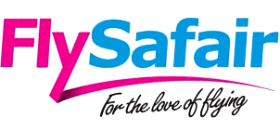 FlySafair Strike Resolution Signals New Era for South African Aviation
FlySafair Strike Resolution Signals New Era for South African Aviation
South Africa's largest domestic carrier has successfully concluded a challenging chapter, with FlySafair and the Solidarity union reaching a comprehensive agreement that ended a disruptive 12-day pilot strike on August 1, 2025. The resolution marks a significant milestone for the airline industry across the continent, demonstrating how constructive dialogue can transform workplace tensions into sustainable operational frameworks.
The strike, which began on July 21, affected thousands of passengers and highlighted critical issues within South Africa's aviation sector. However, the mediated settlement through the Commission for Conciliation, Mediation and Arbitration has established new benchmarks for pilot working conditions that could influence labor relations throughout African aviation markets.
At the heart of the dispute were concerns over scheduling practices and compensation structures that pilots deemed unsustainable. The previous system allowed management considerable flexibility in roster adjustments, creating unpredictable work patterns that affected pilot welfare and potentially flight safety. The new agreement introduces fixed scheduling rules that guarantee pilots at least one 60-hour weekend off every six weeks, ensuring a minimum of nine weekends annually for personal time.
Beyond weekend provisions, the settlement guarantees pilots at least 10 days off per month, with mechanisms allowing them to reclaim time when called to work on scheduled rest days. This structured approach to crew scheduling represents a significant shift toward work-life balance principles that are increasingly recognized as essential for maintaining high safety standards in commercial aviation.
The financial components of the agreement reflect the current economic pressures facing aviation professionals across Africa. Pilots will receive annual salary increases ranging from 6% in the first year to 6.9% in the fourth year, with identical percentage increases applied to travel, accommodation, and medical allowances. Additionally, pilots working more than 65 hours monthly will receive overtime compensation, addressing concerns about excessive workloads.
To offset losses incurred during the strike period, FlySafair agreed to provide a one-time ex gratia payment equivalent to 15% of monthly salary for all affected pilots. This gesture, combined with the option for pilots to cash in up to five days of leave, demonstrates the airline's commitment to rebuilding relationships with its workforce.
The operational impact of the strike extended far beyond the cockpit, affecting FlySafair's extensive network that serves 15 destinations across six countries with a fleet of 36 Boeing 737 aircraft. As South Africa's dominant domestic carrier, controlling approximately 60% of the country's domestic seat capacity, any disruption to FlySafair's operations creates ripple effects throughout the regional travel ecosystem.
During the strike period, the airline's customer service teams implemented comprehensive recovery initiatives to minimize passenger inconvenience. Full refunds were processed for cancelled flights, while passengers were offered the alternative of receiving vouchers for the complete value of their original bookings. This dual approach provided flexibility for travelers while maintaining customer loyalty during a challenging period.
Communication strategies proved crucial in managing the crisis, with SMS and email notifications sent to all affected passengers using contact details provided during booking. Airport teams were deployed to provide on-ground assistance, helping passengers with rebooking options and processing refunds or vouchers. These measures reflect evolving customer service standards that African airlines must adopt to remain competitive in an increasingly demanding market.
The resolution comes at a critical time for South African aviation, which is experiencing significant transformation. The industry is projected to grow from USD 6.29 billion in 2023 to USD 8.66 billion by 2032, driven by recovering tourism demand and expanding regional connectivity. However, this growth occurs against a backdrop of persistent challenges including infrastructure constraints, high operational costs, and regulatory pressures.
FlySafair's ability to resolve this labor dispute while maintaining its market position demonstrates the resilience that will be essential for African carriers navigating future challenges. The airline's 94.4% on-time performance record for 2025 and its extensive interline partnerships with major international carriers including Air France-KLM, Qatar Airways, and Emirates position it well for continued expansion.
The strike resolution also highlights broader trends affecting aviation labor markets across Africa. Skills shortages, emigration of qualified professionals, and evolving workplace expectations are creating new dynamics that airlines must address proactively. The FlySafair agreement establishes precedents for balancing operational efficiency with employee welfare that other carriers may need to consider.
For travel professionals across Africa, the FlySafair situation offers valuable insights into crisis management and customer retention strategies. The airline's transparent communication approach and comprehensive compensation policies provide a template for handling operational disruptions while preserving brand reputation and customer relationships.
Looking ahead, the agreement positions FlySafair to capitalize on South Africa's tourism recovery, which saw 8.5 million foreign visitors in 2023, representing a 48.9% increase from the previous year. With 75.6% of arrivals coming from other African countries, the airline's domestic and regional network remains strategically positioned to serve growing intra-African travel demand.
The successful resolution of this labor dispute reinforces the importance of constructive dialogue in addressing industry challenges. As African aviation continues its post-pandemic recovery, the FlySafair model demonstrates how airlines can transform operational challenges into opportunities for strengthening both employee relations and customer service standards. This approach will prove increasingly valuable as the continent's aviation sector navigates the complexities of sustainable growth in an evolving global marketplace.
